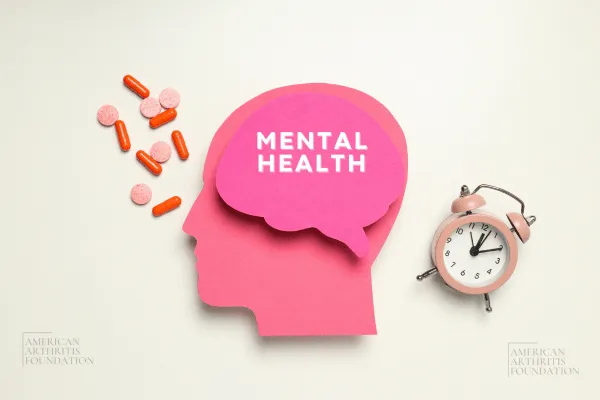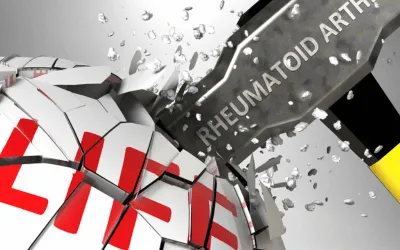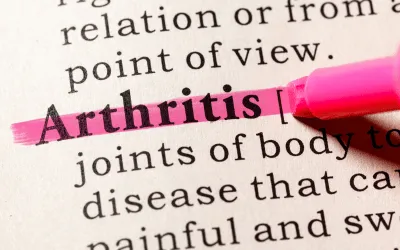About Arthritis
As the nation’s #1 cause of disability, arthritis affects nearly 60 million adults and 300,000 children. Over 100 types of arthritis and related conditions damage the joints and often other organs.
How can we assist you?
Helpful Tools for You

Beyond the Joint Pain: The Hidden Toll of Rheumatoid Arthritis on Mental Health
Living with rheumatoid arthritis (RA) is often described in terms of physical pain, swollen joints, and stiffness. But for many people, the struggle is more than skin (or joint) deep. RA doesn’t just tax the body – it can also take a serious toll on the mind. In fact, researchers have found that people with RA are far more likely to experience mental health issues like depression and anxiety compared to those without RA. Yet these emotional challenges often remain in the shadows, underdiagnosed and undertreated, even as they worsen patients’ quality of life. This article explores how RA and mental health are connected and why addressing both physical and emotional well-being is key to living better with RA.
Depression and Anxiety: More Common in RA Than You Think
Higher Rates in RA: Numerous studies confirm that depression and anxiety are significantly more common in RA patients than in the general population. One meta-analysis found that about 16–17% of people with RA live with major depressive disorder – roughly 2 to 3 times higher than the rate in people without RA. Anxiety disorders are also elevated: around 25% of RA patients show clinically significant anxiety, versus only about 4% in the general public. In practical terms, this means at least one in five individuals with arthritis experiences depression or anxiety, a prevalence much higher than average. These numbers highlight that mental health struggles are not the exception but a common part of the RA experience.
Undiagnosed Suffering: Equally concerning is that these mood issues often fly under the radar. Patients and doctors may be so focused on swollen joints and immune-suppressing medications that they overlook feelings of hopelessness or worry. In one survey, about 38% of RA patients reported symptoms of depression or anxiety, yet only 17.7% had ever received a formal mental health diagnosis. In other words, more than half of those who were psychologically suffering had been missed. This underdiagnosis can lead to inadequate treatment – a serious gap, given that untreated depression or anxiety can make it harder to manage RA itself (for example, by reducing motivation to stick with medications or exercise). It’s clear that recognizing mental health symptoms in RA is just as important as recognizing physical ones.
How RA Symptoms Contribute to Emotional Distress
RA’s impact on mental well-being isn’t surprising when you consider the day-to-day realities of the disease. Chronic pain, fatigue, and the uncertainty of flares create a perfect storm of stressors that can wear down even the strongest coping skills. Studies show that people with arthritis who experience the most intense pain are also the most likely to be anxious or depressed. This may be a two-way street, but one direction is clear: pain can incite depression. The constant discomfort and limitations of RA act as chronic stressors on the body and mind. Over time, persistent stress elevates certain hormones and neurochemicals (like cortisol and adrenaline) that disrupt the brain’s normal mood regulation. Essentially, living with daily pain can biologically fuel feelings of sadness, helplessness, or irritability.
Fatigue and “Invisible” Burdens: Beyond pain, fatigue is another crushing symptom of RA that contributes to mental distress. This disease-related exhaustion is not just being tired at the end of the day – it’s a profound weariness that can make every activity feel like a chore. Inflammation itself can generate fatigue, and this constant lack of energy can drag a person down emotionally. It often becomes a vicious cycle: because of pain and fatigue, someone with RA might reduce activities they enjoy, avoid exercise, or skip social outings. Over time they may become more isolated, lose their sense of independence, and suffer poor sleep – all changes that can dampen mood and spark depression. The emotional burden of having a lifelong, unpredictable illness (and sometimes dealing with work disability or financial strain from medical costs) adds further weight. It’s easy to see how living with RA is a constant emotional challenge as well as a physical one.
Anxiety and Uncertainty: If depression is one side of the coin, anxiety is often the other. RA’s unpredictable nature – never knowing when the next flare-up will strike or how much worse your joints might get – can create constant worry. Many patients feel fear of disease progression: for example, anxiety about waking up one morning with severe pain, or concern about losing the ability to work or care for family in the future This health-related anxiety can manifest as general nervousness, panic attacks, or a tendency to avoid activities for fear of aggravating the condition. Unfortunately, such avoidance can lead to a smaller, more limited life, which in turn feeds depression. Patients may also feel anxious about taking strong RA medications or potential side effects, further contributing to stress. In short, RA places people on an emotional roller coaster – dealing with pain and fatigue on one hand and worrying about what’s next on the other.
Inflammation and the Brain: The Immune–Mood Connection
It’s not just the psychological strain of RA that links it to mental health problems. Biology plays a role too. RA is an autoimmune disease marked by chronic inflammation, and researchers increasingly find that inflammation can directly affect the brain and mood. The immune system chemicals that drive joint inflammation – for instance, proinflammatory cytokines like tumor necrosis factor (TNF-α) and interleukin-6 – also interact with our nervous system. Elevated levels of these cytokines have been linked to changes in neurotransmitters (the brain’s chemical messengers) involved in mood regulation In essence, the same inflammatory proteins that cause swollen joints and pain may also alter brain function, contributing to symptoms like depression, fatigue, and “brain fog.” Scientists even use the term “cytokine-induced depression” to describe how surges in inflammation can trigger depressive symptoms For example, higher blood levels of C-reactive protein (a marker of inflammation) are associated with significantly higher rates of depression in the general population, reinforcing that inflammation and mood are deeply interwoven.
Encouragingly, this immune–mood connection suggests that taming inflammation might help lift mood. Some studies have found that when RA patients receive effective anti-inflammatory treatment for their arthritis, their mental health can improve as well. In fact, a 2020 analysis of 30 clinical trials found that various anti-inflammatory strategies – including certain medications and omega-3 fish oil supplements – led to meaningful relief from depressive symptoms in people with major depression. This doesn’t mean an ibuprofen is a cure for depression, of course. But it does underscore that RA-related depression may have a physiological component. Standard antidepressant drugs (which adjust brain chemicals like serotonin) sometimes fall short in RA patients, perhaps because they don’t address that inflammatory driver. Researchers are continuing to examine whether targeting immune activity (through RA medications or adjunct therapies) could become part of a comprehensive approach to managing depression in chronic inflammatory diseases like rheumatoid arthritis
The Challenge of Overlooked Mental Health Needs in RA
With the clear links between RA and mental health, one might expect that rheumatology clinics would routinely check on patients’ emotional well-being. However, the reality is that mental health needs often go overlooked in RA care. Doctors and patients understandably tend to prioritize the immediate physical aspects – controlling joint damage, reducing pain, improving mobility – especially during rheumatology appointments that are often brief and focused on lab results or medication management. This medical focus on the body can unintentionally “crowd out” discussions of mood. As researcher Cynthia Crowson, PhD, noted, “Assessment of anxiety and depression in people with RA is often overlooked because the focus on controlling the physical symptoms and disease progression of RA can sometimes reduce recognition of mental health conditions.” In addition, many healthcare providers have limited training in addressing psychiatric issues in the context of a rheumatologic disease. The end result is a gap in care: a patient might mention feeling “a bit down” or having trouble sleeping, and it may not be fully explored amid the checklist of swollen joints and medication side effects.
Patients themselves may also hesitate to bring up mental health struggles. Some fear that acknowledging depression or anxiety will make them seem “weak” or distract from the primary treatment. Others simply don’t realize that their despair or worry is connected to their RA – or they assume feeling bad is just something they have to live with. This stigma and misunderstanding can further keep important conversations from happening. Unfortunately, ignoring these issues doesn’t make them go away. Unmanaged depression and anxiety can sabotage RA treatment: studies show that people with RA who are depressed have poorer medication adherence and less optimal outcomes in the long run. They tend to experience higher pain levels, greater fatigue, and more limitation in daily activities than their non-depressed counterparts, even when the joint disease is otherwise similar In severe cases, untreated mental health conditions can even increase the risk of mortality in RA, through factors like suicide or the effects of chronic stress on the heart. All of this makes it crucial that healthcare providers and patients alike start viewing mental health as a core component of RA care, not an optional add-on.
Why Standard Depression Treatments May Fall Short
Even when RA patients do seek help for mental health, they can face unique challenges in finding relief. Typical treatments for depression and anxiety – such as antidepressant medications or psychotherapy (talk therapy) – are certainly beneficial for many people with RA, but they don’t always fully relieve symptoms in this group. One reason is that if the depression is being partly driven by active RA inflammation or uncontrolled pain, then a pill targeting serotonin or a weekly counseling session might only solve part of the problem. The root causes of distress in RA are complex. As Glenn Treisman, MD, PhD, a psychiatrist at Johns Hopkins, explains, some patients with RA aren’t so much experiencing a primary depressive disorder as they are feeling demoralized by the relentless challenges of their disease. “They’re suffering from rheumatoid arthritis… That doesn’t respond to antidepressants. It responds to support and time,” Dr. Treisman notes In cases like that, the patient might start an antidepressant and wonder why their mood isn’t improving drastically – but if their day-to-day pain remains high or they feel socially isolated, those factors could be outweighing the medication’s effects.
Moreover, depression in the context of chronic illness often has deep psychological underpinnings. Grief over lost abilities, anger at one’s own body, or anxiety about the future can all accompany RA. Standard therapies can help, but there is no quick fix. Other experts caution that while antidepressant drugs may take the edge off symptoms, they might not resolve deeper problems such as persistent stress or lack of social support. Psychotherapy (like cognitive-behavioral therapy) can teach coping skills and is an important tool – yet if a patient’s depression is compounded by severe fatigue and they cannot even get to therapy sessions regularly, its impact may be limited. In short, RA-related mood issues often require a nuanced, multi-faceted approach. It may involve adjusting one’s RA treatment to better control disease activity, incorporating pain management strategies, and utilizing mental health treatments in tandem. The silver lining is that RA patients are resilient, and with the right support – whether through counseling, support groups, medication, or often a combination – many do find their footing emotionally. But it starts with acknowledging that feeling depressed or anxious with RA is not a personal failing, and that sometimes extra help is needed when standard treatments don’t fully work.
The Case for Comprehensive Care: Treating Body and Mind Together
Given all the above, experts are increasingly advocating for a holistic approach to RA treatment – one that addresses both the physical inflammation and the mental health of the patient. The logic is simple: RA’s physical and emotional aspects are so intertwined that treating one without the other is unlikely to yield the best results. As one rheumatology report put it, rheumatologists, primary care doctors, and mental health professionals should “work together to develop and implement integrated care models that address the multifaceted needs” of patients dealing with rheumatic diseases and mood disorders This could mean having routine depression and anxiety screenings in rheumatology clinics, collaborative care where a mental health specialist is part of the arthritis care team, or at least close communication between your rheumatologist and your therapist or psychiatrist. Research suggests that such integrated approaches lead to better patient outcomes and overall well-being. For instance, if your rheumatologist knows you are struggling emotionally, they might prioritize more aggressive pain control or refer you to pain management programs, which in turn can improve your mood. Conversely, if your therapist understands the physical aspects of your RA, they can help tailor coping strategies for pain flare-ups or body-image issues stemming from joint changes.
Importantly, treating mental health conditions can improve RA outcomes too. Patients whose depression and anxiety are addressed tend to have lower pain perception, less fatigue, and better daily function than those with untreated psychological distress. They are also more likely to stick with their RA medications and therapy regimens, because it’s easier to maintain motivation when you’re not weighed down by hopelessness. In a real sense, effective mental health care can act as a force multiplier for physical treatment. It breaks the vicious cycle – relieving depression can raise a person’s pain tolerance and energy levels, enabling them to stay active and engage in their own care, which then keeps their joints mobile and inflammation in check. The end result is a virtuous cycle instead of a vicious one. As the Arthritis Foundation emphasizes, treating not only your arthritis but also your anxiety or depression is key to living your fullest life with One without the other is simply not enough.
Don’t Suffer in Silence: Taking Action for Your Mental Well-Being
If you have rheumatoid arthritis, it’s vital to remember that your mental health is an essential part of your overall health. Depression and anxiety are not “all in your head,” and you’re certainly not alone in feeling this way. It can be hard to distinguish normal sadness or stress from a deeper problem, but pay attention to persistent signs of emotional distress – for example, feeling hopeless or “numb” for weeks, constant worry, changes in sleep or appetite, or loss of interest in things you used to enjoy. These feelings are just as important to discuss with your healthcare provider as any physical symptom. Talk to your rheumatologist or primary care doctor about what you’re experiencing. They can screen you for depression or anxiety (a simple questionnaire can be a start) and refer you to appropriate resources In fact, the Centers for Disease Control and Prevention (CDC) encourages rheumatology clinics to connect patients with self-management programs to help manage stress and pain in tandem. If your doctor doesn’t bring up mental health, don’t hesitate to bring it up yourself – it’s an important conversation to have.
Remember that seeking help is a sign of strength, not weakness. Treatment for mental health might include therapy, support groups, stress-reduction techniques, or medications, and many of these approaches can be tailored to people with chronic illness. The goal is to break out of the downward spiral of pain and despair and replace it with a support network and coping strategies that uplift you. Many patients find that when their emotional burden lightens, managing the physical aspects of RA becomes easier, and vice versa. You deserve care for all aspects of RA – both mind and body. By working with your healthcare team and speaking up about your mental health, you take an active role in your wellness. This comprehensive care approach not only improves day-to-day quality of life, but can also ultimately improve your RA outcomes, creating a healthier you on all fronts. Living with RA is a journey with challenges, but you don’t have to carry the emotional weight alone – help is available, and brighter days are ahead with the right support.
Effects of Arthritis

Cause of Disability
In the United States, 23% of all adults, or more than 54 million people, have arthritis. It is a leading cause of work disability, with annual costs for medical care and lost earnings of $303.5 billion.

Workforce Effects
Sixty percent of US adults with arthritis are of working age (18 to 64 years). Arthritis can limit the type of work they are able to do or keep them from working at all.

Global Impact
In fact, 8 million working-age adults report that their ability to work is limited because of their arthritis. For example, they may have a hard time climbing stairs or walking from a parking deck to their workplace.
Promoting Interventions That Reduce Arthritis Pain
American Arthritis Foundation recognizes several proven approaches to reduce arthritis symptoms:
Be active. Physical activity—such as walking, bicycling, and swimming—decreases arthritis pain and improves function, mood, and quality of life. Adults with arthritis should move more and sit less throughout the day. Getting at least 150 minutes of moderate-intensity physical activity each week is recommended.
Protect your joints. People can help prevent osteoarthritis by avoiding activities that are more likely to cause joint injuries.
Talk with a doctor. Recommendations from health care providers can motivate people to be physically active and join a self-management education program. Should your arthritis be interfering with your activities of daily living you may be a candidate to receive many new treatments, and learn how to reverse the arthritis condition.
Learn more about Arthritis:
Arthritis Advice
Get better control of your arthritis with help from our experts. Arthritis can be confusing, but don't worry, we have the tips you need to make it easier to manage.
Have a question?
We're Here to Help
By providing my phone number, I agree to receive text messages from the business.


